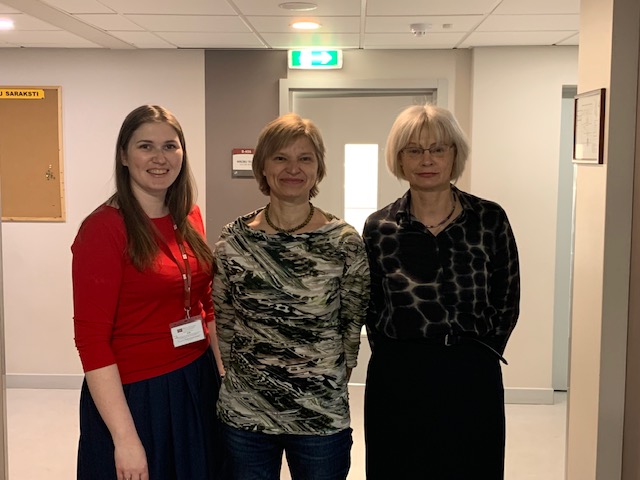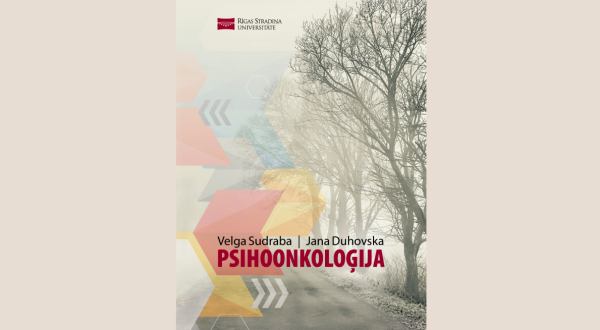Believing in the Good in People! RSU Lecturers Teach Latvian to Ukrainian Refugees
It was Lāsma Sirmule who thought of organising Latvian language courses for Ukrainian refugees and to use proven Latvian language curricula. She is a lecturer at Riga Stradiņš University (RSU) and knows the curricula well because she uses it in her daily work.
According to Dace Žibala, Head of the RSU Language Centre, the invitation to apply for the classes was posted on social networks about a month and a half ago, when the first refugees from Ukraine were arriving in Latvia. The response was unexpectedly high already in the first few hours.
 From left: Lāsma Sirmule, Daiga Tetere, Dace Žibala
From left: Lāsma Sirmule, Daiga Tetere, Dace Žibala
Ukrainians want to learn Latvian
So many Ukrainians responded to the initial post that Lāsma could not undertake to teach everyone on her own. She emailed colleagues inviting them to join in this voluntary and important work. Sniedze Vilde and Līva Bodniece responded. Meanwhile, Agnese Cera had already started working with a group of Ukrainians, having responded to another call on social media. Thus, an individual initiative turned into a project implemented by the RSU Language Centre.
Baiba Freidenfelde, a former lecturer at the RSU Language Centre, also posted an offer to teach Latvian on Facebook. Because so many people responded to this invitation too, another RSU colleague, lecturer Daiga Tetere, came to her aid. She says that demand for learning Latvian is currently greater than supply. In order to make the learning process effective, group sizes cannot be too large. Learning a language often requires individual attention, explanations, and revision. Even though online classes allow for a larger number of participants than the in person classes, the quality can be lost.
In total, about five teachers are teaching 60 refugees from Ukraine the basics of Latvian.
‘It is very depressing witnessing such brutal aggression against an entire population so close by. I developed an inner urge to get involved and to help and I am doing by donating my knowledge and my time,’ says Daiga to explain where her motivation comes from.
The training takes place remotely on Zoom making use of the University’s experience in organising remote learning.
The classes take place like any other foreign language lessons. There are exercises, homework, tests, and explanations.
Daiga adds that Latvian is a very difficult language to learn at the beginning. For example, all native speakers of Slavic languages struggle with pronunciation, but on the other hand, they are very good at picking up and understanding Latvian grammar.
Highly motivated to learn
Dace says that according to her colleagues, Ukrainians feel more urgency to learn Latvian than international students usually are. Latvian is a compulsory course for international students at RSU, but they might not feel such a strong need to integrate into society and the labour market as quickly.
This is a time when social networks, especially Facebook, have showed that they can contribute in a positive way, because it was thanks to them that many Latvian language study groups were set up, which otherwise might have been more difficult to fill.
The role of an intermediary language in the learning process
The Head of the Language Centre emphasises the importance of the intermediary language. While English is used to teach Latvian to foreign students, this is not always possible with Ukrainians, so teachers might need to brush up on their Russian.
An intermediary language makes it much easier to explain grammatical rules, the meaning of words, and other aspects of a language. It should be noted, however, that some lecturers are taking the opportunity to try out a language teaching method without the use of an intermediary language.
The training has been running for about four weeks and will continue as long as there is interest. There is no specific end date planned.
Ukrainians want to learn to use the language as quickly as possible so that they can speak Latvian in shops, administrative offices, or even just on the street.
The curriculum is therefore tailored for immediate use, not just with long-term goals in mind.
Learning a language as psychological support
Daiga explains that learning a language is a psycho-emotional process.
Language lessons can also provide emotional support, communication, and one could even say a form of psychological help for people who have experienced a war and may have had their homes destroyed, or a loved one killed.
As many participants have told their teachers, they wake up and go to sleep with their phones in their hands because they are constantly reading the latest news and communicating with relatives left behind in the war zone. The classes are an opportunity for them to completely "disconnect" from the horrors that are happening nearby, because for an hour and a half the biggest problem becomes choosing the right inflection or memorising new words. The participants really appreciate the training and all the support and help they have been receiving from people in Latvia. It helps them believe in the good in humanity.
This is a good example of how we can help Ukrainian refugees with our professional knowledge and time rather than just with money or donations. We invite everyone to think about how to help all Ukrainian refugees in Latvia to feel as comfortable as possible.




